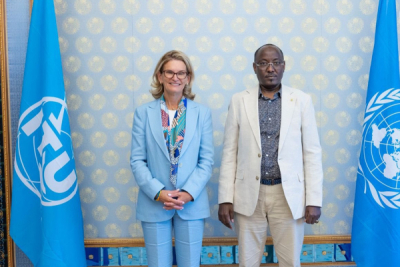• Chad to invest $1.5bn by 2030 in digital transformation and e-government.
• ARCEP, ITU push to train civil servants, young professionals in digital skills.
• 2,000 youths trained in AI as Chad seeks to boost startups, jobs, innovation.
Chad plans to invest $1.5 billion through 2030 to accelerate its digital transformation, focusing on digitizing public services. However, the government faces challenges in ensuring public employees can effectively use the new digital platforms.
The Chadian government wants to enhance cooperation with the International Telecommunication Union (ITU) to develop digital skills among its young cadres. This objective emerged during the 2025 Global Symposium for Regulators (GSR-25), held from August 31 to September 3 in Saudi Arabia.
At this event, Haliki Choua Mahamat, Director General of Chad’s Regulatory Authority for Electronic Communications and Posts (ARCEP), met with Doreen Bogdan-Martin, ITU Secretary-General. Both emphasized investing in training young professionals, especially in regulatory roles, to support digital transformation and manage strategic infrastructure effectively.
This initiative builds on recent efforts by Chad to strengthen local digital capacities. In late July, the Agency for Development of Information and Communication Technologies (ADETIC) signed a framework agreement with the International Institute for Water and Environmental Engineering (2iE) based in Ouagadougou. The agreement includes training Chadian cadres in artificial intelligence and emerging technologies. Additionally, the National School of ICT (ENASTIC) and 2iE signed a separate protocol to facilitate academic exchanges and joint program development.
Between August 4 and 14, Chad organized free AI training for 2,000 young people aged 15 to 35, with partners including UNESCO and the World Bank. Authorities present this program as a gateway to employment, innovation, and digital entrepreneurship through startup creation. This comes amid projections by the World Bank that approximately 230 million jobs in sub-Saharan Africa will require digital skills by 2030.
The Organisation for Economic Co-operation and Development (OECD) stresses the need to invest in public officials’ skill development, as digital technologies can transform administration by enabling more accessible and efficient service delivery.
The February 2024 OECD report Developing Skills for Digital Government: A Review of Good Practices across OECD Governments stresses that building a digital government—where technology shapes processes, policies and services tailored to citizens’ needs—requires public administrations to adopt new working methods and skills, while also fostering the abilities, attitudes and knowledge that allow civil servants to thrive in a digital environment and generate public value.
This article was initially published in French by Isaac K. Kassouwi
Adapted in English by Ange Jason Quenum



















